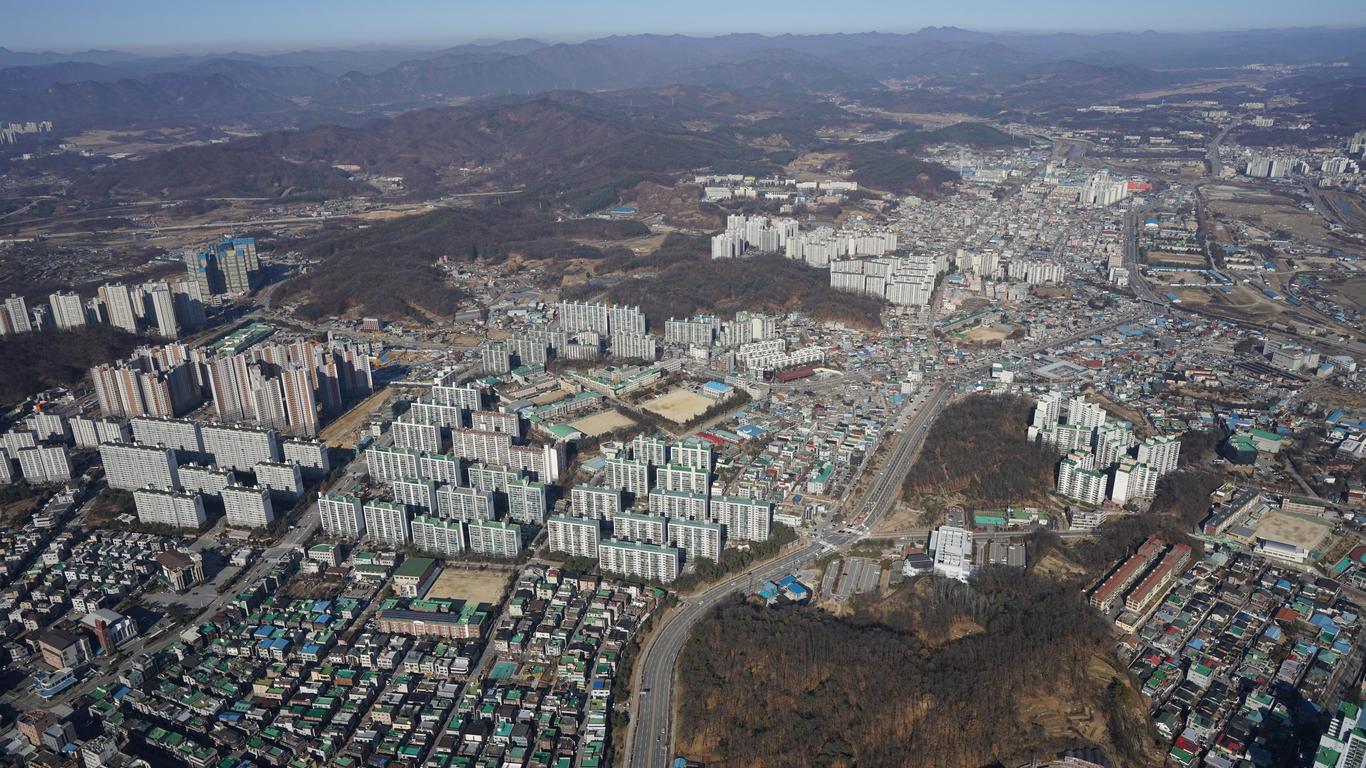
Wonju is a fascinating city located in the Gangwon Province of South Korea. With a rich history, vibrant culture, and stunning natural beauty, Wonju has become a popular destination for both locals and tourists alike. In this article, we will explore 39 interesting and lesser-known facts about Wonju that will give you a deeper understanding of this remarkable city. From its historical landmarks and traditional festivals to its delicious cuisine and outdoor recreational activities, Wonju offers something for everyone. So, prepare to discover unique insights into Wonju’s past, present, and future, and get ready to be captivated by the charm and allure of this hidden gem in South Korea.
Key Takeaways:
- Wonju, South Korea, is a charming city with rich history, stunning natural beauty, and vibrant culture. From traditional Hanbok to cherry blossoms, Wonju offers a delightful experience for all visitors.
- With its tranquil scenic beauty, traditional festivals, and warm hospitality, Wonju seamlessly blends tradition and modernity, making it a must-visit destination for nature lovers, history buffs, and anyone seeking a peaceful getaway.
Historical Significance
Wonju has a long and storied past, dating back over 2,000 years. It was first mentioned in historical records during the Three Kingdoms period.
Tranquil Scenic Beauty
With its picturesque landscapes, Wonju is a haven for nature lovers. The city is surrounded by stunning mountains and offers awe-inspiring views of the Seorak and Chiaksan Mountains.
Cultural Capital of Gangwon Province
Wonju is often referred to as the cultural capital of Gangwon Province, thanks to its thriving arts scene and numerous cultural festivals and events.
Traditional Hanbok
Wonju is famous for its traditional Hanbok, the Korean traditional clothing. The city is home to a Hanbok research institute dedicated to preserving and promoting this cultural heritage.
Educational Hub
Wonju is known for its excellent educational institutions, including the prestigious Yonsei University Wonju campus and other top-rated universities and colleges.
The Iconic Wonju Bridge
Spanning the scenic Han River, the Wonju Bridge is an iconic symbol of the city, offering panoramic views and serving as a picturesque backdrop for photos.
Traditional Korean Medicine Capital
Wonju is renowned for its traditional Korean medicine, with many herbal medicine clinics and research centers located throughout the city.
Craftsmanship of Hanji Paper
The art of Hanji paper-making has been passed down through generations in Wonju. Hanji paper is known for its durability and unique texture, and is used for various purposes including crafts and traditional artworks.
The Birthplace of Jeontong Yeoiju
Wonju is the birthplace of Jeontong Yeoiju, a traditional Korean liquor known for its rich flavor and high quality.
Wonju Dialect
Just like any other region in Korea, Wonju has its own distinct dialect, adding to the charm of the city and reflecting its unique cultural identity.
Traditional Korean Folk Village
The Gangneung Wonju Traditional Korean Folk Village offers visitors a glimpse into the rich history and traditional way of life in Korea, with its well-preserved hanok houses and cultural exhibits.
Stunning Cherry Blossoms
During springtime, Wonju is transformed into a dreamlike wonderland with its cherry blossoms in full bloom. The city’s parks and streets are adorned with beautiful pink petals, creating a magical atmosphere.
The Oldest Sweet Potato Market
Wonju is home to the oldest sweet potato market in South Korea, showcasing a vast variety of delicious and locally grown sweet potatoes.
Land of Traditional Festivals
Wonju hosts numerous traditional festivals throughout the year, including the Jongwon Festival, Dano Festival, and the Hanji Culture Festival.
Historic Baekundong
Baekundong is a well-preserved historic district in Wonju, where visitors can experience the charm of traditional Korean architecture and explore quaint shops and galleries.
Kimchi Capital
Wonju takes pride in its delicious kimchi, and the city is known as the “Kimchi Capital” of Gangwon Province. Visitors can savor a wide variety of kimchi dishes.
Birthplace of Famous Artists
Wonju has been the birthplace of numerous famous artists, writers, and poets who have made significant contributions to Korean culture and literature.
Natural Hot Springs
Wonju is blessed with natural hot springs, offering relaxation and healing properties. Visitors can indulge in the rejuvenating experience of traditional Korean spa culture.
Agricultural Produce
The fertile lands surrounding Wonju yield a diverse range of agricultural produce, including apples, mushrooms, and organic vegetables.
Hub for Traditional Crafts
Wonju is a hub for traditional crafts, with skilled artisans producing exquisite ceramics, lacquerware, and metalwork that reflect the city’s rich cultural heritage.
Host City of International Events
Wonju has played host to several international events, including the World Taekwondo Hanmadang and the Global Nongsa Challenge.
A City of Museums
Wonju boasts a wide array of museums, including the National Museum of Traditional Korean Music, Wonju Museum of Art, and the Geological Museum of Korea.
Vibrant Sports Culture
Sports are deeply ingrained in the city’s culture, with Wonju hosting various sporting events and being home to several professional sports teams.
Breathtaking National Parks
Wonju is surrounded by stunning national parks, including Chiaksan National Park and Taebaeksan Provincial Park, providing abundant opportunities for outdoor activities and hiking.
Center for Traditional Martial Arts
Wonju is a center for traditional martial arts, with many martial arts schools and centers dedicated to preserving and promoting the rich martial arts heritage of Korea.
The Peace and Harmony of Sogeumgang Village
Known for its serene atmosphere, Sogeumgang Village is a hidden gem in Wonju. Visitors can experience the tranquility of traditional Korean village life and immerse themselves in nature.
The Beautiful Wongol Village
Wongol Village is a picturesque rural village in Wonju, renowned for its rolling hills, traditional hanok houses, and breathtaking natural beauty.
The Traditional Taste of Baekdamsa Temple Cuisine
Baekdamsa Temple in Wonju offers visitors the opportunity to savor the unique and delicious vegetarian cuisine traditionally served in Buddhist temples.
A Glimpse into the Joseon Dynasty
The picturesque Jeamsan Seongtaek, a recreation of a fortified village from the Joseon Dynasty, allows visitors to step back in time and experience the rich history of Korea.
Gateway to Stunning Waterfalls
Wonju serves as a gateway to picturesque waterfalls, including Cheondong Falls and Deungseon Falls, where visitors can marvel at the beauty and power of nature.
Home to Traditional Korean Music
Wonju is known for its deep-rooted love for traditional Korean music, with various cultural performances and concerts held throughout the year.
The Charms of Sky Park
Sky Park offers visitors panoramic views of Wonju and the surrounding mountains, making it the perfect spot to embrace the beauty of the city.
The Allure of Cherry Blossom Tunnel
Every spring, the Cherry Blossom Tunnel in Wonju attracts visitors from near and far. Walking through this breathtaking tunnel of cherry blossoms is truly a magical experience.
Stunning Fall Foliage
During autumn, Wonju’s mountains and parks come alive with a kaleidoscope of vibrant colors as the leaves change, creating a picturesque backdrop for leisurely strolls and outdoor activities.
Land of Legendary Generals
Wonju is considered the birthplace of many legendary generals who played significant roles in Korean history, including General Kim Yushin and General Bae Jung-jae.
The Captivating Hanji Theme Park
The Hanji Theme Park in Wonju offers visitors an immersive experience into the world of Hanji paper, showcasing its history, production process, and various applications.
Famous Traditional Dol Hareubang Sculptures
Wonju is home to unique traditional Dol Hareubang sculptures, often associated with protection and good luck in Korean folklore.
The Spirited Wonju Night Market
Every summer, the Wonju Night Market comes alive with vibrant energy, offering a wide range of street food, live performances, and shopping opportunities.
The Warm Hospitality of Wonju’s Locals
A visit to Wonju is not complete without experiencing the warm and welcoming hospitality of the locals, who take pride in sharing the beauty and charm of their city.
So there you have it: 39 fascinating facts about Wonju, a city that seamlessly blends tradition and modernity, offering a delightful experience for all who visit. Whether you’re a nature lover, history buff, or simply someone seeking tranquility, Wonju has something to offer everyone. So why wait? Start planning your trip to this captivating city and immerse yourself in all that Wonju has to offer!
Conclusion
In conclusion, Wonju is a city rich in history, culture, and natural beauty. From its stunning mountain ranges and scenic rivers to its ancient temples and vibrant festivals, there is something for everyone to enjoy in Wonju. Whether you are interested in exploring the city’s historical landmarks, indulging in its unique cuisine, or immersing yourself in traditional Korean culture, Wonju offers a diverse range of experiences. With its convenient location and excellent transportation system, visiting Wonju is both easy and enjoyable. So, don’t miss the opportunity to discover the hidden gems of this charming city and create unforgettable memories in Wonju.
FAQs
Q: What is the best time to visit Wonju?
A: The best time to visit Wonju is during the spring and autumn seasons when the weather is mild and comfortable. During these times, you can enjoy the beautiful cherry blossoms in spring or the stunning fall foliage in autumn.
Q: How do I get to Wonju?
A: Wonju is easily accessible by various modes of transportation. You can reach Wonju by train from Seoul in approximately one and a half hours. Alternatively, you can take a bus or drive to Wonju using the excellent road network.
Q: What are some must-visit attractions in Wonju?
A: Some must-visit attractions in Wonju include Chiaksan National Park, Bangoksa Temple, Wongwangsa Temple, and the Hanji Theme Park. These sites offer a glimpse into the city’s natural beauty, cultural heritage, and traditional crafts.
Q: Is Wonju a suitable destination for outdoor activities?
A: Yes, Wonju is an excellent destination for outdoor enthusiasts. The city boasts several hiking trails, biking routes, and rivers suitable for various activities such as hiking, trekking, mountain biking, fishing, and kayaking.
Q: What is Wonju’s specialty cuisine?
A: Wonju is famous for its unique local delicacies. Some must-try dishes include “Chobap” (rice balls with various fillings), “Janchi Guksu” (feast noodles), “Wonju Dakgalbi” (spicy stir-fried chicken), and “Makguksu” (buckwheat noodles in a spicy sauce).
Q: Are there any festivals or events held in Wonju?
A: Yes, Wonju hosts several festivals and events throughout the year that showcase the city’s cultural heritage and traditions. The Chunhyang Festival, Wonju Dynamic Dancing Carnival, and the Hanji Festival are some of the popular events that attract visitors from near and far.
Wonju's enchanting beauty and rich history captivate visitors, but there's more to explore in this fascinating country. Discover the vibrant
Was this page helpful?
Our commitment to delivering trustworthy and engaging content is at the heart of what we do. Each fact on our site is contributed by real users like you, bringing a wealth of diverse insights and information. To ensure the highest standards of accuracy and reliability, our dedicated editors meticulously review each submission. This process guarantees that the facts we share are not only fascinating but also credible. Trust in our commitment to quality and authenticity as you explore and learn with us.


